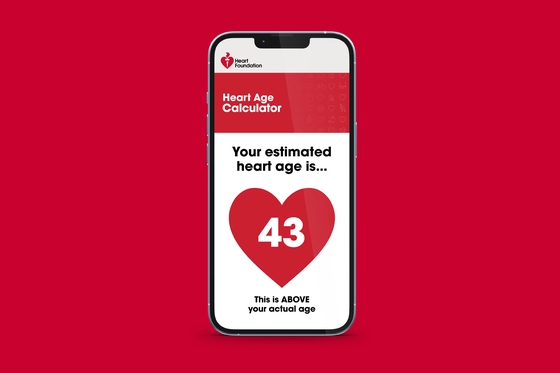
Is your heart feeling your age?
Blog: 21 September, 2023
Have you ever wondered how old your heart is?
It might seem like a strange question. Surely your heart is the same age as you? But when we talk about ‘heart age,’ we aren’t talking chronologically...
What do we mean by ‘heart age’?
Your heart age is a number given by the Heart Foundation’s Heart Age Calculator that represents an estimation of your risk of having a heart attack or stroke.
Your heart age is calculated based on well-known risk factors for heart disease. This includes things like your age, sex, blood pressure, whether you smoke, your cholesterol levels, and whether you have a family history of heart disease.
The calculation takes the information you enter and compares your numbers with a set of numbers within the healthy range for someone your age, for each category. If you leave some of the questions blank, the calculator will automatically fill it with an average value for someone of your age living in Australia.
The calculator takes all of these comparisons, works its magic, and then gives you a ‘heart age’! If you want to get technical, the ‘magic’ is an algorithm that combines the Framingham Risk Function and Australian clinical guidelines.
Want to give it a try? You can use the Heart Age Calculator on the Heart Foundation website. The Heart Age Calculator is very easy to use, and you can find out what your estimated heart age is within a couple of minutes!
What does my ‘heart age’ mean?
So now that you have your number, what does that actually mean for you – and your heart?
If your heart age is higher than your chronological age, that could mean that you may be at an increased risk of having a heart attack or stroke. It doesn’t mean you need to panic, but if you get this result, you should book in with your doctor to discuss the result and get a Heart Health Check. It’s important to remember the Heart Age Calculator is simply one tool in your toolkit for great heart health. It will help you better understand your own potential risk factors, and kickstart a discussion with your GP who will do a more comprehensive assessment of your heart health.
If your heart age and your chronological age are the same, that means that you may have a lower risk of a heart attack or stroke. This is compared to someone the same age as you.
It is important to remember though, that not having an increased risk isn’t the same thing as no risk! Keeping an eye on your heart health is crucial for everyone.
Can I make my heart age younger?
The good news is that there are certainly things you can do to decrease your risk of heart disease. This, in turn, has the potential to alter your heart age outcome.
Since the calculator uses risk factors to work out your heart age, you can change your heart age by changing your risk factors.
Of course, some of them can’t be changed, like your actual age, height, gender or family history of heart disease. But some of the factors are ‘modifiable’ risk factors, which means they are things you CAN change. This includes your weight, smoking status, blood pressure and cholesterol levels.
Making lifestyle changes is a great place to start. Quitting smoking will directly affect your heart age in the calculator. Other lifestyle changes, such as increasing your amount of physical activity and enjoying a heart-healthy eating pattern will make indirect changes, by helping you to manage your weight, cholesterol levels and blood pressure.
Sometimes, things like your blood pressure or cholesterol might need medicines to change. Your doctor can help you understand what your heart age means and also help with lifestyle changes or medicine (if required) to help you manage these risk factors.
More ways to understand your risk
The better you understand your risk of heart disease, the better equipped you might be to reduce it.
As always, speaking to your doctor is a great place to start. If you are over 45, or 35 for Aboriginal and Torres Strait Islander people, they can perform a Medicare subsidised Heart Health Check.
You can also read some of our other blogs which talk about all things nutrition, physical activity and taking care of your heart!
You might also be interested in...

Heart Age Calculator
Take the heart age test to check your heart health. Use our heart health check calculator to understand your risk of heart disease and heart attacks.

What is a Heart Health Check?
A Heart Health Check (MBS item number 699 and 177) is the patient-friendly term for a comprehensive CVD risk assessment and ongoing management plan for people who do not have CVD.

How to follow a heart healthy eating pattern
Follow these easy tips to boost your heart health and embrace a heart-healthy eating pattern.
Last updated07 March 2024